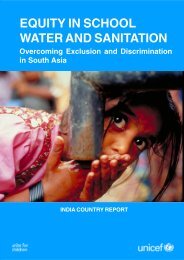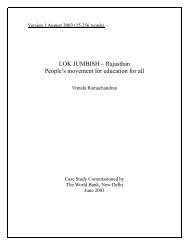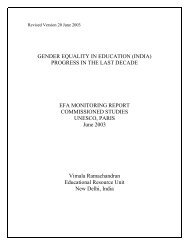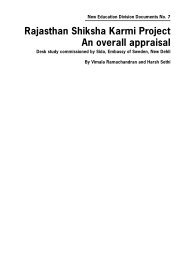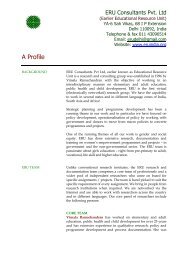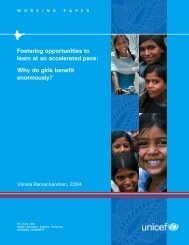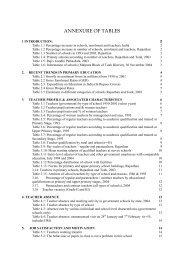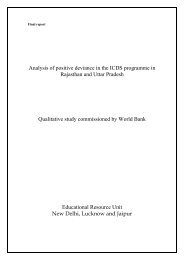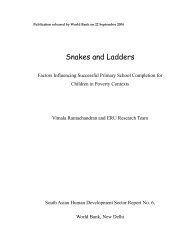primary school teachers the twists and turns of everyday practice
primary school teachers the twists and turns of everyday practice
primary school teachers the twists and turns of everyday practice
Create successful ePaper yourself
Turn your PDF publications into a flip-book with our unique Google optimized e-Paper software.
Version 20 Oct 08, edited final<br />
help in real classroom situations. Once again, educational policy needs to be based<br />
on ground realities ra<strong>the</strong>r than on wishful thinking.<br />
Most important <strong>of</strong> all, <strong>teachers</strong> will tend to teach as <strong>the</strong>y <strong>the</strong>mselves were taught,<br />
unless <strong>the</strong>y are provided with opportunities <strong>and</strong> incentives to analyse <strong>and</strong> question<br />
<strong>the</strong>ir own experience <strong>and</strong> <strong>the</strong>reby construct a different conception <strong>of</strong> what classroom<br />
processes should aim to achieve. At different points throughout this booklet we have<br />
described how <strong>teachers</strong> typically ‘follow orders’, ‘cover <strong>the</strong> syllabus’, ‘fill out<br />
formats?’, <strong>and</strong> so on, irrespective <strong>of</strong> children’s learning outcomes. It is hard to think<br />
<strong>of</strong> a more damning indictment <strong>of</strong> <strong>the</strong> education system than this single fact: <strong>teachers</strong><br />
do not even conceive <strong>of</strong> <strong>the</strong>ir work in terms <strong>of</strong> creating an environment where all<br />
children can learn.<br />
Obviously, <strong>the</strong>se issues have pr<strong>of</strong>ound <strong>and</strong> far-reaching implications for <strong>the</strong> quality<br />
<strong>of</strong> <strong>teachers</strong> that we produce <strong>and</strong> for <strong>the</strong> learning outcomes that <strong>the</strong>y are able to<br />
ensure. The explosion <strong>of</strong> private teacher-training institutions in many states<br />
complicates <strong>the</strong> situation even fur<strong>the</strong>r, given that huge numbers <strong>of</strong> ‘trained’ <strong>teachers</strong><br />
are being produced by institutions with limited interest in educational quality <strong>and</strong><br />
over which state governments have little authority. Currently, <strong>the</strong> teacher-training<br />
certificate is a piece <strong>of</strong> paper which is required in many states for appointment to a<br />
teaching position, <strong>and</strong> has no more relevance than that.<br />
Are <strong>the</strong>re alternative models available? As described in Chapter III <strong>of</strong> this booklet,<br />
<strong>the</strong>re certainly are. The Rajasthan Shiksha Karmi Project was based on an entirely<br />
different conception <strong>of</strong> what it means to be a teacher, <strong>and</strong> <strong>the</strong>refore on who could<br />
become a teacher <strong>and</strong> how <strong>teachers</strong> should be trained <strong>and</strong> supported. The B.El.Ed<br />
course <strong>of</strong>fered by Delhi University, while starting out with a different set <strong>of</strong><br />
assumptions <strong>and</strong> objectives, <strong>of</strong>fers students an opportunity to grapple with real<br />
issues involved in teaching <strong>and</strong> learning ra<strong>the</strong>r than reproducing educational <strong>the</strong>ory<br />
in examinations. If states <strong>and</strong> institutions have failed to take advantage <strong>of</strong> <strong>the</strong> rich<br />
learnings generated by <strong>the</strong>se <strong>and</strong> o<strong>the</strong>r initiatives, it is because <strong>the</strong>y fail to prioritise<br />
educational processes over administrative requirements.<br />
Conclusion 2. Once <strong>teachers</strong> are appointed, not only does <strong>the</strong> education system<br />
fail to identify, much less reward, good teaching <strong>practice</strong>, it actively discourages it<br />
in a variety <strong>of</strong> ways.<br />
Above <strong>and</strong> beyond what beginning <strong>teachers</strong> bring to <strong>the</strong> job, <strong>the</strong> education system<br />
acts in a number <strong>of</strong> ways to shape what <strong>teachers</strong> do in <strong>the</strong> classroom. These include<br />
<strong>the</strong> nature <strong>and</strong> amount <strong>of</strong> in-service training <strong>the</strong>y are provided, <strong>the</strong> kind <strong>of</strong><br />
supervision <strong>and</strong> support <strong>the</strong>y receive <strong>and</strong> <strong>the</strong> incentives <strong>the</strong> system <strong>of</strong>fers for<br />
dedicating more or less effort to teaching. In addition, <strong>the</strong> degree <strong>and</strong> nature <strong>of</strong><br />
<strong>teachers</strong>’ accountability—to <strong>the</strong>ir employers, to <strong>the</strong>ir students, or to parents—affects<br />
what <strong>the</strong>y are willing to attempt, while <strong>the</strong>ir degree <strong>of</strong> autonomy impacts <strong>the</strong>ir<br />
ability to adapt content <strong>and</strong> methods to local needs. We briefly discuss <strong>the</strong>se issues<br />
below.<br />
In-service teacher-training<br />
State education systems rarely if ever bo<strong>the</strong>r to ask <strong>teachers</strong> what kind <strong>of</strong> training<br />
would be useful to <strong>the</strong>m. It seems quite difficult to comprehend that an in-service<br />
training programme on teaching in multi-grade classrooms or on <strong>the</strong> special needs <strong>of</strong><br />
first-generation learners, to name only two possibilities, has (to <strong>the</strong> best <strong>of</strong> our<br />
65



